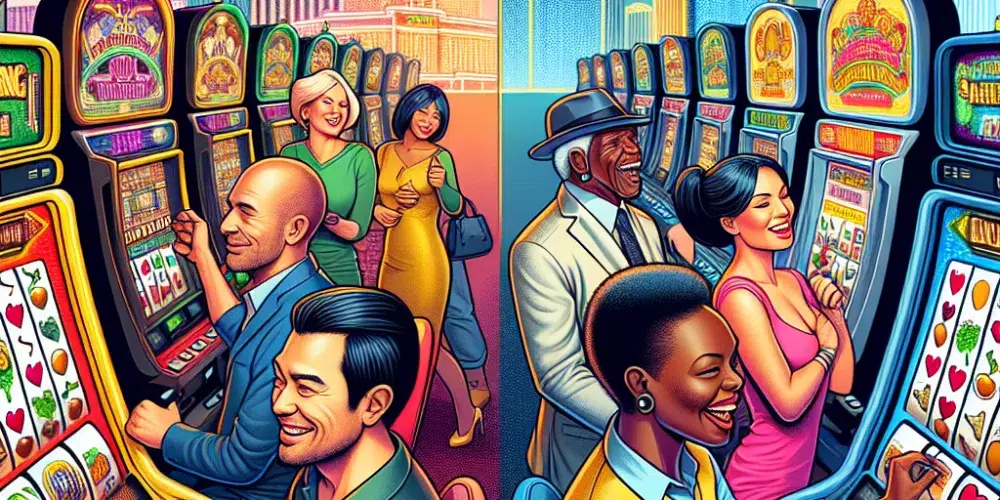In the shimmering heart of Las Vegas, a groundbreaking shift is sweeping through the casino floors that might just redefine gambling as we know it. The traditional model of slot machines, long reliant on luck and chance, is undergoing a radical transformation with the introduction of skill-based slot games. This innovative gaming trend is not just altering how games are played; it’s reshaping the demographic of players and their engagement in one of the world’s most vibrant gambling capitals.
A New Era of Interactive Gaming
Skill-based slot games blend the excitement of video gaming with the thrill of gambling, offering players a chance to influence the outcome with their skills. Games that were once pure chance are now interspersed with interactive, skill-based bonus rounds where performance can affect winnings.
The introduction of these games marks a significant pivot in casino offerings, aimed primarily at attracting millennials, who have shown a preference for games that require skill and strategy. Unlike their traditional counterparts, these modern machines feature complex narratives, advanced graphics, and elements typical of video games like those seen in popular esports tournaments.
The Mechanics Behind the Innovation
At the forefront of this innovation is GameCo, a dynamic startup that’s deployed skill-based games in several Vegas casinos. Their popular game, “Danger Arena,” is a first-person action game where player performance can increase potential payouts. According to Blaine Graboyes, CEO of GameCo, “We’ve seen a fantastic response from younger players who look not just to gamble but to be actively involved in the game’s outcome.”
In “Danger Arena,” players go through levels of varying difficulty, with their winnings tied directly to their gaming prowess. This skill-based element introduces a new layer of strategy to traditional slot gaming, potentially increasing the time and money players spend on machines.
The Impact on Casino Economy
The economic implications of these games are profound. Initial data suggests that skill-based slot machines may lead to longer playing times per customer, higher engagement, and, crucially, repeat visits. Casinos are monitoring these metrics closely, as the success of these games could lead to a widespread overhaul of gaming floors worldwide.
“Introducing skill-based slots is part of our strategy to innovate and provide varied experiences to our guests,” says Maria Henderson, a casino operations manager at The Venetian. “We’re seeing new faces and previous visitors spending more time on these games, which is great for our business.”
Regulatory and Operational Challenges
However, the introduction of skill-based games isn’t without challenges. Regulatory bodies have had to adapt to ensure these games meet gambling fairness standards while maintaining the integrity of the skill elements. In Nevada, the Gaming Control Board has set stringent regulations that determine how much skill influences the payout compared to luck.
Moreover, casinos face the logistical challenge of balancing these new machines with traditional ones, ensuring they cater to both their classic clientele and the new wave of gamblers these games attract.
Future of Skill-Based Gambling
As the trend gains momentum, the potential for new and innovative games is vast. Industry insiders speculate that future developments could include multiplayer gaming competitions or hybrid games that incorporate virtual reality. These advancements could transform casinos into all-encompassing entertainment hubs, appealing to a broader audience beyond conventional gamblers.
Key Takeaways
– Skill-based slot games are emerging as a driving force in Las Vegas, aiming to attract a younger, more video game-savvy clientele.
– These games integrate elements of video gaming, including narratives and graphics that require skill and strategy, influencing the game’s outcome and potential winnings.
– Economic data indicates these games might boost engagement and revenue for casinos through increased playing times and higher patron retention rates.
Conclusion
The casino industry in Las Vegas is on the cusp of a significant transformation with the rise of skill-based slot games. As this trend grows, it will not only change the types of games we see on the casino floor but also who plays them and how they are played. The fusion of gaming and gambling might just be the jackpot the industry is betting on for the future.

Garry Sputnim is a seasoned journalist and storyteller with over a decade of experience in the trenches of global news. With a keen eye for uncovering stories that resonate, Alex has reported from over 30 countries, bringing light to untold narratives and the human faces behind the headlines. Specializing in investigative journalism, Garry has a knack for technology and social justice issues, weaving compelling narratives that bridge tech and humanity. Outside the newsroom, Garry is an avid rock climber and podcast host, exploring stories of resilience and innovation.


